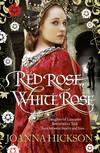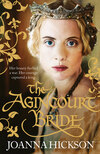Kitabı oku: «The Lady of the Ravens», sayfa 3
3

WHEN A BARGE WAS sighted on the river flying Lady Margaret Beaufort’s portcullis emblem, the Coldharbour household went into high alert. With his coronation only a few days off, she had been staying with the king at Kennington Palace to assist in the arrangements and her return to her own home so close to that date was a surprise.
I watched with Elizabeth from a window in the great hall as the noble lady disembarked, along with a procession of porters bearing gifts, doubtless gleaned from among those presented to King Henry to celebrate his crowning: baskets of oranges probably from Spain, crocks of honey and casks of wine from France. As usual she was elegantly garbed in a deep red velvet gown trimmed with gold fringes and a close-fitting black chaperon hat against the sharp river breeze. Although she had accepted the somewhat ageing title of ‘My Lady the King’s Mother’, at not much more than forty she was still fit and energetic and strode briskly up the garden path that led from the quay to the mansion, taking the slope without slowing her pace.
She did not come to the great hall however, but went to her solar and sent a page to summon me, rather than first paying her respects to Elizabeth, who was more than somewhat peeved. ‘She will not acknowledge the servant before the mistress when I am married to her son,’ she muttered, sinking back onto the cushions of the window seat and taking refuge in her embroidery, while I blushed furiously, murmured an unnecessary apology as if it were my fault, and fled from the hall to obey Lady Margaret’s call. Not for the first time I felt the strain of being Elizabeth’s attendant as well as, at present, her only friend.
The kind lady who had been my foster mother was now the first lady in the land; at least until King Henry took a wife as queen. I had been with her almost throughout the time of her son’s exile, grown up under her strict but compassionate care and stayed with her as a companion and foster daughter until the usurper had discovered her part in a rebellious attempt on his throne and sentenced her to house arrest under the supervision of servants loyal to him. Her own household had been forced to leave and I had not returned until after her son Henry had fought for the throne and won it.
‘How are things between you and Elizabeth, Joan?’ she asked as soon as we had exchanged kisses of greeting.
‘They are fine, my lady,’ I replied, ‘or they were until you summoned me ahead of greeting her.’
‘Oh dear, have I offended her?’
‘Just a little I think.’ I smiled at the slight note of insincerity in her voice.
‘Well, she is not queen yet and until she is I remain first lady in the land. It will do her no harm to accept this for the time being.’
‘I’m sure she will do so graciously – for the time being.’ I laid a certain stress on the last words and received my patron’s smile in return. She was a tiny woman with a big heart and a sharp intellect; I admired her enormously.
Except when on her knees at prayer she was rarely still and at this moment she tucked her hand in the crook of my arm and walked me towards the window of her solar, which overlooked the Thames. ‘It pleases me greatly that you have obviously become a good friend to the Lady Elizabeth, Joan, but you must realise that you do not have sufficient rank to hold a senior position among her ladies when she becomes queen. The king has asked me to supervise the appointment of her female household and I think it would look good if her sister Cecily were to be chief among them. But I am not sure how well the two get on. Do you happen to know whether such a partnership would work?’
I hesitated before answering. Having only observed the two princesses together as young girls, on the odd occasion they had been there when I had attended Lady Margaret at their parents’ court, I had not gleaned any real idea of how they got on. ‘I couldn’t say, my lady,’ I admitted. ‘She talks about her sisters often and worries how they are, but I don’t get the impression that she and Cecily were particularly close. I think Princess Mary was her favourite and closest to her in age but of course she died.’
I felt Lady Margaret give my arm a gentle squeeze. ‘Yes, how sad that was. Do you think you could sound Elizabeth out about Cecily for me, Joan? I don’t want to suggest she appoint her as chief lady-in-waiting, only to have her immediately veto the idea. It might jeopardise our future relationship.’
I took a deep breath. Negotiating royal relationships was not something I had ever imagined doing. ‘I can try, of course, but would this not be something their mother might advise you about?’
Lady Margaret glanced around, as if there might be a spy lurking in her solar. ‘Their mother is presently living at Sheen Palace and has yet to demonstrate reliable support for the Tudor crown. My son does not believe her to have entirely abandoned the Yorkist cause but by bringing Cecily into her household, Elizabeth would be indicating that her whole family supports King Henry’s reign. And after suffering the humiliating marriage foisted on her by the usurper, as the queen’s chief lady-in-waiting Cecily would acquire high status once more and a good income, which should inspire her gratitude, if nothing else. By the way, I will be telling Elizabeth that her sister’s regrettable misalliance is to be officially annulled by the consistory court in York in December.’
This would be welcome news to Elizabeth, who had fretted much over the fact that in order to provide for the nieces he had rendered illegitimate, the usurper Richard had arranged a marriage for Cecily with one Ralph Scrope, the younger brother of a Yorkshire baron, and I assumed that at only fourteen, it was not a union she had entered willingly.
‘How well do you get on with your sister Cecily, Lady Elizabeth?’ I tried to slip this question in casually as I helped her to dress on the day of King Henry’s coronation, hoping that her mind would be occupied and she might not question the query.
But she did. ‘Why do you ask, Joan?’
‘It’s been suggested that you might appoint her as your chief lady-in-waiting – after your marriage, of course.’
‘When I am queen you mean.’ Her chin lifted. ‘Who made the suggestion? Was it the king’s mother?’
Blood rose to my cheeks. ‘Well, yes, it was Lady Margaret. Does that matter?’
Elizabeth gave a considered sniff. ‘No, not really, but now I know why she snubbed me and commanded your presence the other day without greeting me first. That will not happen when I am queen. I will be first lady and she will walk behind me, whether the king likes it or not. I was reared to be a queen, Joan. She was not.’ She turned to gaze out of the window, which faced west, the direction in which lay Westminster. ‘I do not need anyone to tell me how to perform my duties, or what respect I should be owed.’
I bit my lip before responding. ‘I do not believe there was any disrespect behind the suggestion that you might appoint your sister as your chief attendant. Lady Margaret thought you might feel more comfortable with a member of your family at your side.’
‘I will have the king at my side. He will be my family and when we have children, so will they.’
I dared to pursue the point. ‘Does that mean you would prefer not to appoint Lady Cecily?’
The expression of offended nobility left her face and was replaced by one of mischievous intent. ‘No. It means I will do my own appointing and when I require her help I will ask for it. You can tell Lady Margaret that if you like, Joan.’
Two days after the coronation the king’s mother came to Coldharbour again, this time to give Elizabeth a description of the event and the celebrations that had followed. I could tell from her expression that Elizabeth was in two minds as to whether she wanted to hear this, probably preferring to have had King Henry’s impressions from his own lips. However, having already been waiting impatiently for longer than she liked, she was not about to refuse Lady Margaret’s account.
It was a highly charged one. ‘It was an extremely moving occasion, dear Elizabeth!’ she began. ‘A ceremony of such immense significance! I do not know how the king remained dry-eyed. Of course I should not have succumbed to tears but when the archbishop placed the crown on my son’s head I admit I was overwhelmed. Nor was I alone in this. Even his uncle, the great Jasper Tudor, had tears sliding down his cheeks as he knelt to be the first to make his oath of allegiance.
‘God’s presence and approval was divinely evident throughout the ceremony. Henry’s anointing was truly awe-inspiring, even though it was performed under a canopy and hidden from view; as the holy chrisom was applied the choir’s anthem rose in a glorious crescendo and I felt as if my heart would burst. Everywhere was brilliant spectacle; the new green and white uniforms of the yeoman guards, the red robes and jewelled coronets of the barons and the splendidly embroidered copes of the clergy, led by the bishops with their gilded mitres and gem-studded croziers. It was enough to bring pride and joy to every heart and a prayer to every lip.’
She reached out to take Elizabeth’s hand and held it between her own, her face charged with sympathy. ‘I am so sorry you were not there. Had it not been for the question of rank, of course you would have been and I’m sure you’d have been more thrilled and proud than anyone. The king has asked me to assure you that when parliament meets next week, after the Act of Royal Title has been repealed and every copy consigned to the bonfire, there will be parliamentary endorsement of his long-avowed intention to marry you and to unite the warring factions of Lancaster and York under a new Tudor dynasty.’
Gently and politely Elizabeth removed her hand, clasping both of hers tightly together in her lap once more. ‘I will look forward to hearing that from the king’s own lips, my lady,’ she said. Her back grew straighter and her head seemed to rise above Lady Margaret’s.
My glance swung from one to the other and I noticed a marked similarity in their expressions. Both women were direct descendants of King Edward the Third and pride was etched into each face; steely resolve glinted in the blue eyes and the grey. For a time I had fretted that Elizabeth might have met her match in My Lady the King’s Mother but at that moment I recalled her recent forceful declaration that she would be first lady and walk beside the king. ‘I was reared to be a queen, Joan. She was not.’
I felt a surge of relief. The wedding was on and Elizabeth was exerting her authority. The fear of rebellion receded and with it the prospect of violence in the streets of London and a resurgence of civil war. I wished I could be at the Tower, to see if ravens were flocking in on a new sense of national security.
4

AS HER WEDDING DREW nearer, Elizabeth had taken the initiative and invited Cecily to lead her ladies-in-waiting. When the two sisters put their heads together to select the ladies and gentlewomen who would be invited to attend the new queen, it made me smile to see how they joined forces, gently but firmly, to inform Lady Margaret of their choices.
Just as she had claimed a seat at the right hand of the king at the meetings of his Privy Council, My Lady the King’s Mother had automatically assumed that she would supervise the selection of his queen’s ladies, but although she was consulted, the growing list of possible attendants gradually began to show more bias towards York than she liked. ‘This one does not ring any bells with me,’ she commented, pointing to a name on the list, ‘unless she was the Lady Katherine Grey who served your mother with me and was then widowed. I don’t know who she married afterwards.’
‘Yes, it is the same woman,’ Elizabeth said with a smile. ‘I always liked her when she served my mother. Sadly, she has no children and has made it known that she would be available to serve me, should I wish to welcome her into my household.’
‘But her husband is an esquire, so she would have to accept that she could not be a lady-in-waiting but only a gentlewoman of the bedchamber.’ I sensed rather than saw Lady Margaret cast a glance at me, where I sat in my usual discreet corner, book in hand. ‘Joan Vaux is an equally experienced attendant, is she not? Would she not be a better appointment in that capacity? You might also consider appointing Joan’s mother, Lady Vaux, as your chief lady of the bedchamber. That is if serving under her mother would not discomfort her daughter. Would it, Joan?’
With the attention of all the royal ladies on me I closed my book and rose to reply, grateful for Lady Margaret’s promotion of my mother because I had been dreading having to make the suggestion myself. ‘I had not dared to assume that I would be on the list, my lady,’ I said. ‘But if I am to be so honoured, of course I would have no objection to serving under my mother. In fact both she and I would be privileged to serve the queen in any way she commands.’
But then Lady Margaret caused my heart to miss a beat when she mentioned something I would have much preferred she had not. ‘Joan may not have told you, Elizabeth, but when the king asked me to nominate a female to attend security instruction from his Ushers of the Chamber I asked her to go, knowing she could be relied on to remember all the details without writing them down.’
Elizabeth gave me a quizzical look and I felt my cheeks begin to burn. ‘I was ordered to tell no one,’ I admitted. ‘Usher Gainsford told us that it was information only for the ears of those who had taken an oath of loyalty to the king.’
Elizabeth’s expression turned from curiosity to anger. ‘And I had not, is that it? Indeed will not, until I make my marriage vows. But how did they know that you would be among my attendants when – if – I became queen, Joan?’
I could hear the hurt in her voice and hung my head. ‘I cannot say, my lady.’
The king’s mother replied for me. ‘Because I vouched for her, believing that you had found Joan as clever, kind and obliging as I always have. If I have made the wrong assumption I can only apologise.’
I held my breath, fearing that in doing Lady Margaret’s bidding and keeping faith with my secrecy vow, I had destroyed Elizabeth’s trust and lost places in her household for both my mother and me. When I risked a glance, her face was a picture of indecision. I could see by the way her mouth was working that she was considering whether or not I had betrayed our friendship by appearing to favour Lady Margaret over her. She was anxious and bewildered, a bride at the steps of the altar, wracked with nerves about what the future held for her.
To my surprise Cecily spoke up on my behalf. ‘Surely there can be no one more trustworthy and helpful than Joan, Elizabeth. Look how she has served you and consoled you through all these months of waiting, wondering whether you were going to be forced into a misalliance like I was, or enclosed in a convent, or raised to the consort’s throne, as is your right and due as our father’s heir.’
I looked at Lady Margaret, who appeared delighted with Cecily’s robust defence of both me and her sister’s rightful place in the kingdom. Then I hung my head once more and waited, hoping I had not condemned the Vaux name to ignominy, not daring to look at Elizabeth, for fear of seeing her friendship fading away and with it my own future as a member of her court.
At length she spoke. ‘I have to acknowledge the truth in that, Cecily,’ she said. ‘I must have tried her patience horribly.’ She rose from her seat and came towards me. ‘I am sorry I doubted your loyalty, Joan. I admit that you have been my rock in a sea of uncertainty. Of course I can trust you above all people.’ She placed her hands on my shoulders and kissed my cheek. ‘I cannot imagine my royal bedchamber without your presence. Whatever top-security secrets you hold in that book-filled head of yours, I’m sure they will protect me from all manner of harm.’
Retiring once more to my corner, I reflected what a momentous and hazardous life Elizabeth had ahead of her. For all her claim to have been reared to the role she had to play, she was still only a girl of nineteen; she would need all the help and support of her mother, her sisters, her ladies and her gentlewomen, if she were to achieve all that was expected of her as England’s first Tudor queen and the fertile heart of the Tudor rose.
In early December, once parliament had confirmed the marriage contract between Henry and Elizabeth and set the wedding for mid-January, I had been surprised at the speed of subsequent arrangements. Even my friends at the silk workshop commented on it.
‘There is little more than a month to make preparations,’ Rosie remarked when I went to the passementerie workshop to collect supplies of trimming braid. ‘We’re already working flat out on orders for our products. Yet as well as gowns to be made and feasts to plan, there are tournaments and processions and entertainments to organise and they’ll never get papal dispensation through in a month! Anyone would think there was a reason for speed.’ She grinned slyly around at her fellow workers and I grasped her implication. It was common knowledge that at least a third of brides marrying in London were already pregnant when they took their vows, although few would have admitted the fact.
I had sudden recall of an incident shortly after the wedding date had been announced. With Elizabeth then officially queen-in-waiting, King Henry had granted her the use of Baynard’s Castle in which to gather her household and wardrobe ready for her new life, and she and her sister had immediately taken up residence there. After the Tower, Baynard’s was London’s most imposing fortress, located on the Thames and guarding the western corner of the city wall, and my mother and I had moved there together, awaiting the rest of the new royal household.
Shortly after we had settled in, King Henry had made a surprise visit, delighting Elizabeth, who had been frowning with Cecily over a list of possible candidates for her staff. Mother and I immediately withdrew to an antechamber and within minutes Lady Cecily had joined us. ‘The king says he wants to take Elizabeth into the garden,’ she said with a knowing smile. ‘He has some private business to discuss with her.’
My mother was sympathetic. ‘And why should he not? Heaven knows they have a great deal to discover about each other. But it will be cold in the garden. Joan, you should fetch a cloak for her grace.’ As a practised servant of queens, Lady Vaux was already using the royal form of address and indeed the king had specified that Elizabeth should now be regarded as if she were already his queen.
I had run to the Wardrobe, housed in a tower overlooking the garden, and selected a fur-lined mantle, but when I tried to deliver it, after searching every bush and bower, I could find no sign of the royal couple. Wherever they had gone, it was not into the garden. Surprised and even a little alarmed, I looked for them in the long gallery overlooking the river, thinking that in view of the December cold they might have decided to hold their private conversation there, but the only sign of the royal presence was at the entrance to Elizabeth’s bedchamber where two yeomen guards stood barring my way, holding their crossed halberds against my entry.
‘The king has asked for privacy, mistress,’ one announced. ‘And we are here to make sure he has it.’
With my thoughts whirling, I made my way back to the Wardrobe Tower, replaced the mantle and returned to the river chamber. I did not confide what I had seen to the others. An hour later we heard the sound of King Henry’s departure but Elizabeth did not reappear until supper, when she drew me aside. She looked unusually flushed and I wondered if she might be starting an ague.
‘After the king left I felt a little unwell, Joan,’ she said, ‘and I lay in the bed to rest. When I woke I found that there was blood on my shift and on the sheet, so my monthlies must have started early. Please be so kind as to deal with the laundry and do not mention this to anyone else. I know I can rely on you to be discreet.’
And of course she could, no matter what.
At her wedding Elizabeth looked every inch the royal bride, in a gown fashioned from the rolls of red satin and crimson damask and trimmed with the almost priceless ermine tails that had been her first gifts from King Henry. I had suggested then that these could only be the presents of a king to his bride and she had used them triumphantly to present herself as his true consort.
For many years Mary, Countess Rivers, had been one of my fellow ‘nestlings’, as Lady Margaret had called her clutch of young wards, and she had also been appointed a lady-in-waiting, so my mother and I had enlisted her help to present the queen-to-be as bridal perfection. We had dressed Elizabeth in the spectacular crimson gown, brushed her long red-gold Plantagenet hair down her back as a sign of her virginity and threaded it with jewels to glint in the myriad candle flames of Westminster Abbey. A diamond-studded coronet proclaimed her lineage and a collar of gold, pearls and rubies encircled her neck and breast. Her train was fashioned from cloth of gold and lavishly embroidered with heraldic badges – the falcon and fetterlock of York, the swan of Lancaster and the new Tudor rose – Lancastrian red outer petals and the York white rose at the centre.
In the abbey I watched the bridal procession make its slow, rhythmic progress through the choir screen and towards the chancel. I was immensely proud that my mother was among the trainbearers, especially as the others were, to a greater or lesser degree, all relatives of the bride or groom. Two York princesses, sixteen-year-old Cecily and nine-year-old Anne, led the chosen eight, who all wore red velvet gowns, complementing the bride but without the costly and spectacular ermine and jewels. Significantly, however, on their heads were coronets of red and white silk roses, celebrating the crucial union of the royal houses taking place before our eyes.
Ahead of them Elizabeth walked unaccompanied, gliding like a swan, head high and proud. Even from my lowly place at the back of the choir I could see that King Henry was awestruck by her beauty as he watched her approach him at the chancel steps. She, as much as the kingdom he had conquered, was the prize he had won five months before on that bloody battlefield in Leicestershire.
Ücretsiz ön izlemeyi tamamladınız.






